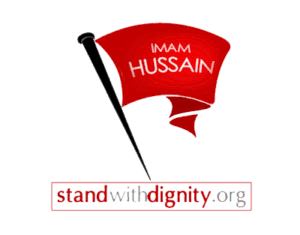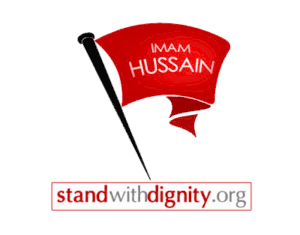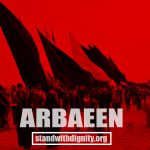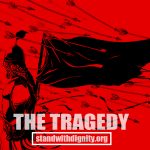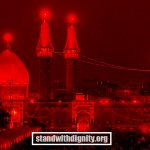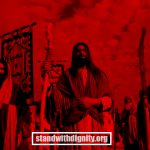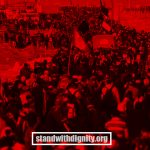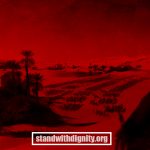By Mr. Muhammad Salahuddin
The conflict between right (truth) and wrong (falsehood) dates back to the creation of Adam. Iblis (Satan) committed the first crime of disobedience and revolt among God’s creatures by refusing to prostrate before Adam, and also took Allah’s leave and challenged that he would distract human beings until the Day of Judgment. The Holy Quran points to his challenge in this verse:
Said he: ‘Now, for thy perverting me, I shall surely sit in ambush for them on Thy straight path; then I shall come on them from before them and from behind them, from their right hands and their left hands; Thou wilt not find most of them thankful. (7:16-7)
Iblis had such confidence in his own ability to detract man that he dared to claim:
If Thou defer rest me to the Day of Resurrection I shall master his seed, save a few. (17:62)
Iblis receives his answer in the following words:
Said He: ‘Depart! Those of them that follow thee – surely hell shall be your recompense, and ample recompense! And startle whomsoever of them thou canst with they voice; and rally against them thy horseman and thy foot, and share with them in their wealth and their children, and promise them!’ But Satan promises them naught, except delusion. ‘Surely over my servants thou shalt have no authority,’ Thy Lord suffices as a guardian. (17:63-5)
The discourse between Allah and Iblis also reveals that when man became the instant target of Iblis’s enmity, he also became the focus of Allah’s special grace, which made full arrangements for his guidance and guaranteed that His guidance shall suffice any man to combat against any pretentions and conspiracies of Iblis. Since man was an eye-witness to the conflict between right and wrong, he was charged with the responsibility of standing as a witness for right. The fixation of this responsibility also determined his status and role. He was directed to live as God’s servant as against that of Iblis, thereby bearing witness as to who was his sustainer and whose guidance he sought.
It is a common observation that the culprit tries to efface, suppress and distort the evidence, so that his false assertions may be admitted and that the truth may not stand or be vindicated. Hence Iblis used his guile to deceive Adam. His first mischief was so effective that Adam and Hawa’ (Eve) faltered. But, as soon as they realized their mistake, they turned to Allah for His forgiveness and mercy. They prayed:
They said: ‘Lord, we have wronged ourselves, and if Thou dost not forgive us, and have mercy upon us, we shall surely be among the lost.’ (17:23)
The supplication clearly indicates that Iblis could not succeed in his mission since he failed to break the relationship of Adam’s servitude to Allah. Adam’s appeal for mercy also indicates the great concern of Adam seek Allah’s pleasure. Since Allah wished to see truth established, He would not let the witness to what is right be destroyed. Hence he accepted the prayers of Adam, and guided him to the right path. He charged him with Prophet-hood, and sent him along with his wife to this earth.
Let us see what was the real intent of the mission of prophet-hood. It was nothing but bearing witness to the truth that Allah is the sole Creator and Master of all human beings and other creatures, and that He alone is Ruler and Sovereign of this Universe. All the prophets, right from Adam down to our last Prophet Muhammad, have been sent to record their witnesses to this great truth and establish man’s relationship of servility to Allah.
The importance and magnitude of the obligation of bearing witness of man’s servility to Allah can be judged form these verses from the Surah Al Imran:
And when Allah took covenant with the Prophets: ‘That I have given you of Book and Wisdom; then there shall come to you a Messenger confirming what is with you–you shall believe in him and you shall help him; do you agree? He said: ‘And do you take my load on you on that condition?’ They said: ‘We do agree.’ Allah said: ‘Bear witness so, and I shall be with you among the witnesses.’ (3:81)
In the covenant that was agreed to jointly between all the prophets and Allah, God made Himself a witness for the prophets and made the prophets a witness for Allah. When the chapter of prophet-hood closed on Muhammad, the responsibility for being a witness to the covenant was passed on to the Muslim umma. In this last stage, our prophet was made a witness to his umma who will vouch for their performance as his heir.
Thus we appoint you a midmost nation that you might be witnesses to the people, and that the Messenger might be a witness to you. (2:143)
One is obliged to think what point there is in this long process of continued action whereby a great galaxy of prophets was called upon to bear witness to the covenant of servility to Allah, and Allah Himself became a witness to the acceptance of the status of a servant, and whereby lastly the last Prophet was appointed as a witness to his umma and then the umma as a witness to the whole of mankind. The reason is simple. As the conflict between right and wrong began with the creation of Adam, there is no doubt that, with the explicit permission of Allah, there could be no period of time when the representation of such a witness from the respecting umma and its Prophet was not needed to abort the schemes of Iblis. The process is continuous; Iblis remains busy in his relentless job and the righteous have to perform their obligation of presenting their evidence without any respite. Iblis invented many devices and laid several traps; sometimes he aroused the instinct of self-worship, sometimes he invented the misleading beliefs of secularism and deism, sometimes he presented natural phenomena as GOD himself, sometimes he exhorted man to worship idols, and sometimes he created the mania for being worshiped, etc. The prophets were sent to counteract all the devices of Iblis and establish the testimony of Allah’s covenant, and each one of them performed the obligation of testifying to the Truth. There is a point to consider here. Allah is all-powerful; He needs no witness to proclaim His Sovereignty, nor does He find himself weak or helpless before Iblis, rather He is powerful enough to deal with Iblis alone. Allah had allowed Iblis a free hand until the Day of Judgment; it would be against the canons of justice if the powerful adversary in the case assumed the role of the Judge. On the other hand, Allah has presented His case in the court of human justice with complete evidence and proofs. He has proved his case through the reasoning and logic contained in all the heavenly ordained books, particularly the Holy Quran, and presented the most reliable witnesses in the forms of prophets sent by Him with clear signs.
There is another side to it–evidence is always for truth, and not for falsehood. Falsehood tries to destroy or suppress the evidence in order to establish its own case. Iblis and his offspring have from the very beginning tried to destroy man’s true evidence, and have gone to the extent of killing prophets and their followers. Allah has rendered them responsible for the murders of many a prophet in this verse:
…..they had disbelieved the signs of Allah and slain the Prophet upright-fully….. (2:61)
They threw Ibrahim into the pit of fire, tried to murder Musa and threw him before the pythons, attempted to crucify Isa, and lastly plotted to kill the holy Prophet at Mecca and in the battles of Badr and Uhad. They did kill several prophets. Yet falsehood miserably failed as it could not obtain a single piece of evidence in its favor at any period of time. Evidence is always in favor of the truth, and falsehood has made every effort to destroy it. Allah regards all His pious servants who perform the obligation of providing testimony as His friends and helpers, though Allah does not need any help. Since the testimony of man confirms the oneness of God and other attributes of Allah, and is an expression as well as an acceptance of the truth, Allah calls man his helper.
O believers, be you Allah’s helpers, as Isa, the son of Maryam, said to the disciples ‘Who will be my helpers unto Allah?’ The disciples said ‘We will be helpers of Allah.’ And a party of the children of Israel believed, and a party disbelieved. So we confirmed those who believed against their enemy, and they became master. (61:14)
We have so far discussed the importance and perspective of man’s testimony; now let us look at it from another aspect which reveals his real stature and exalted position among living beings. Man alone could successfully pass through the test of shouldering the responsibility of this testimony. God has ordained:
If we had sent down this Quran upon a mountain, thou wouldst have seen it humbled, split asunder out of the fear of Allah. And those similitude’s–We strike them for men; haply they will reflect (59:21)
No other creature could afford to share the burden of this responsibility. The Quran reveals the difficulties and patience required for it:
Say: ‘If your fathers, your sons, your brothers, your wives, your clan, your possessions that you have gained, commerce you may fear slacken, dwellings you love – if these are dearer to you than Allah and His Messenger, and to struggle in His way, then wait till Allah brings His command; Allah guides not the people of the ungodly.’ (9:24)
Look at the long list of sacrifices which man has to make to fulfill this obligation. Can one conceive of things dearer and more loveable than those mentioned here? The covenant concerning the relationship between Allah and man has been elucidated in the following verse:
Allah has bought from the believers their selves and their possessions against the gift of Paradise; they fight in the way of Allah; they kill, and are killed; that is a promise binding upon Allah in the Torah, and the Gospel, and the Quran; and who fulfills his covenant truer than Allah? (9:111)
From the contents of the covenant it becomes clear that only man could have performed the onerous task of sacrificing every dear object for the establishment of truth. This could have been performed neither by the high mountains nor by any other creature of Allah. Man has been given an exalted status and preference over every other creature for this very spirit and courage. Allah forbids us to call those who made the supreme sacrifices of their lives in the way of Allah dead. We have been told that this is not death, but eternal and permanent life. Here we should ask why a martyr is considered to be living despite his formal death. The answer is that by sacrificing his life to bear the testimony, he has become an imperishable witness to the covenant of Allah, and every case of right depends on evidence. If evidence is lacking the case falls through. In this universe it is these martyrs who have kept the banner of Allah’s Omnipotence and Sovereignty fluttering high by their selfless sacrifices and ceaseless efforts. It is they who have testified to the truth of His message, the existence of His Being, and His Suzerainty over the universe, by their blood. If we take away the glow lent to the history of Islam by the blood of the martyrs of Badr and Uhad, it will make a very poor and bleak picture of our history.
Since the case for truth (haqq) is admissible only through the evidence provided by these martyrs, Allah has therefore declared them to be living entities. The fact that these martyrs are living beings has already been discussed in verse quoted above. Let us now look at additional verses declaring martyrdom to be a life of eternity from a different angle:
And say not of those slain in Allah’s way; ‘They are dead’; rather they are living, but you are not aware. Surely We will try you with something of fear and hunger, and diminution of goods and lives and fruit; yet give thou good tidings unto the patient who, when they are visited by an affliction, say: ‘Surely we belong to Allah, and to Him we return’; upon those rest blessings and mercy from their Lord, and those – they are the truly guided. (2:154-7)
In these verses we find a reference to the following points that discourage from giving evidence for the establishment of truth: fear, starvation, damage to property and belongings, loss of life, loss of income.
If we reflect, we shall see that these are five types of threat whereby the forces of evil try to control the righteous. Whoever calls to come forward and bear witness is threatened as Pharaoh threatened the faithful in these words:
Said Pharaoh: ‘You have believed in Him before I gave you leave. Surely this is a device you have devised in the city that you may expel its people from it. Now you shall know! I shall assuredly cut off alternately your hands and feet, then I shall crucify you all together.’ (7:123:4)
The tyrant then makes use of economic threats and submits his opponents to hunger, thirst and the deprivation of other necessities of life, to oblige them to surrender and deviate from the Right Path. If these measures do not succeed, then recourse is taken to confiscate property. Even life is not spared. The tyrant at times kidnaps children and threatens to kill them. But when all these measures fail to subdue, and the sincere servant of Allah comes successfully out of this trial by sacrificing even his life, He then confers on him the exalted status of martyrdom and grant him eternal life.
Let us review the eventful incident of the martyrdom of Imam Hussain at Karbala in the historical perspective of the conflict between truth and falsehood that raged from the time of Adam to the time of the Prophet Muhammad vis-a-vis heresy [(dalalah)kufr] and association (shirk). After the sad demise of the Prophet, his responsibilities were passed on to his umma, which was made responsible for carrying on the tradition of furnishing the evidence in favor of truth in each period of history. The Muslim umma has been declared to be a witness for mankind and our last Prophet shall be a witness to the performance of the umma. When and where any evil or disorder originates in society, it becomes incumbent upon the Muslim umma to stand up as the standard bearer of truth and restore the din with its social, political, economic and judicial system in their original forms as they existed during the days of the Prophet.
When Imam Hussain was called upon to perform the obligation of standing as a witness for the Truth, the situation was that the Caliphate had been transformed into a monarchy. Apart from the long list of accusations against Yazid, it would suffice to mention the following three facts upon which there is no difference of opinion among historians and various schools of thought. Bayc a (allegiance) to Yazid was forcibly obtained at the point of the sword and on the basis of power. Yazid had been imposed as the Caliph by the principle of heredity and without any legitimacy. Yazid was in no way the symbol of goodness in the umma. Notwithstanding the primacy of the Family of the Prophet, there were hosts of people from amongst the companions and close followers of the companions who were far superior in knowledge, piety and character to Yazid. Besides all this, there was a saying of the Prophet before the umma:
Whosoever imposes any person on the umma, as governor or administrator, when there are others present in the society who excels him in goodness and capacity for reforming the Muslim umma, commits a breach of trust with Allah and His Messenger.
Imam Hussain was the grandson of Prophet. It was out of character for Hussain to commit a breach of trust and recognize the illegitimate Caliphate of Yazid through bargain, bribe or out of fear. By refusing to accord recognition to Yazid’s Caliphate, Hussain in fact recorded his witness for the truth. He preferred death to the recognition of a libertine. He cheerfully went through all the trials and tribulations mentioned in verses of the Surah ‘al-Hashr’ (59). He manly faced all sorts of pressures, risks and threats. He left his hearth and home, deprived himself of all sources of income and earnings, quietly and ungrudgingly underwent the pangs of hunger and thirst, and even sacrificed all his children including the infant Ali Asghar. History cannot present a single instance wherein any person sacrificed his life, property, children, home, native land, close friends and relations, leaving nothing behind. It is unmistakably a rare example of recording one’s active love for any person, cause or thing.
Imam Hussain exalted the status and reality of evidence by becoming a symbol of courage and sacrifice for the downtrodden and the truthful in their struggle against the forces of tyranny and despotism till the Day of Judgment. The very name of Hussain excited the spirit of courage andresistance to face the forces of evil, and teaches us to live forever through sacrificing our lives. It is the magic of his name that gave impetus to the miraculous Iranian Revolution after fourteen hundred years and inspired the forty million Iranians with the spirit of jihad with the result that Iran stands invincible even against the great powers. We may hold any opinion about the revolution or the policies of the revolutionary government of Iran. It is a fact that such a revolution would never have taken place had there been no event of Karbala to inspire it.
The martyrdom of Imam Hussain is in fact the evidence of truth. Today, anyone who intends to take up arms against tyranny and persecution will have to follow in the footsteps of this Imam. Whenever the question of legitimacy of government in an Islamic state arises, the example established by Imam Hussain will lead us to the Right Path, and it will continue to generate in us the strength and determination to fight against monarchy, despotism and dictatorship.
